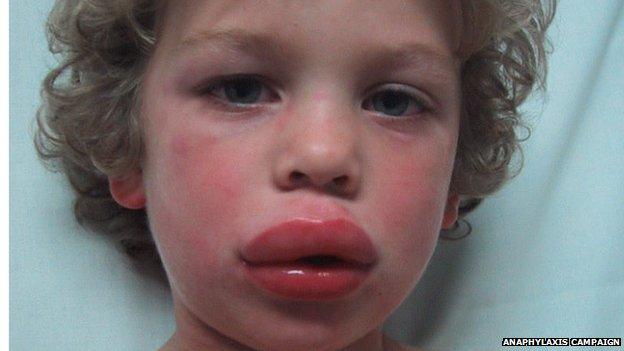Some EpiPen users can use adrenaline pens past expiry date
- Published
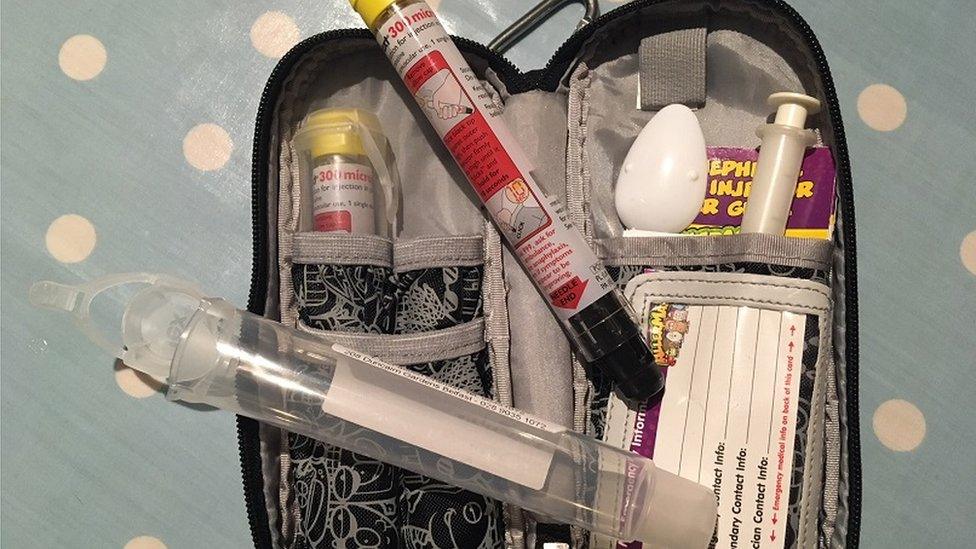
Some of Darragh Henry's medical kit
People with severe allergies have been told they can use their EpiPens safely past their normal expiry date, amid a shortage of the adrenaline pens.
The medicines regulator said it had agreed to extend the use-by date of some EpiPens by four months.
The government says it is working with the makers to resolve the issue.
On Friday, a Belfast mother of a boy with life-threatening allergies warned that the shortage of the devices was putting her son in danger.
Michelle Henry's son Darragh, 9, has multiple allergies to food, the environment and medicine.
He relies on the adrenaline pens in case of a severe anaphylactic reaction.
But problems in the production of EpiPen, the biggest brand of adrenaline auto-injector (AAI) on the market, have led to a shortage.
The distributors, Mylan, said supply problems were due to manufacturing issues.
The Department of Health has said there are two alternative AAI products available in the UK.
'Just as effective'
But there has also been a shortage of the alternative AAIs prescribed in the UK - Jext and Emerade - amid a surge in demand for them.
In response to the shortages, the Medicines and Healthcare Products Regulatory Agency (MHRA) said it had agreed to a request by Mylan, the company behind EpiPen, to extend the expiry date of some batches of the 0.3mg version of the device.
The MHRA said it made the decision after it was given evidence that showed the shelf life of the 0.3mg pen was 20 months from the date it was manufactured.
It said the devices would work "just as effectively" during the extended expiry period.
But the extension does not apply to the 0.15mg version, given to children under 30kg.
EpiPens should not be used if the solution is discoloured, brown, there are solid particles, or signs of leakage or damage.
Other AAIs should never be used after their expiry date without first checking with your medical practitioner.
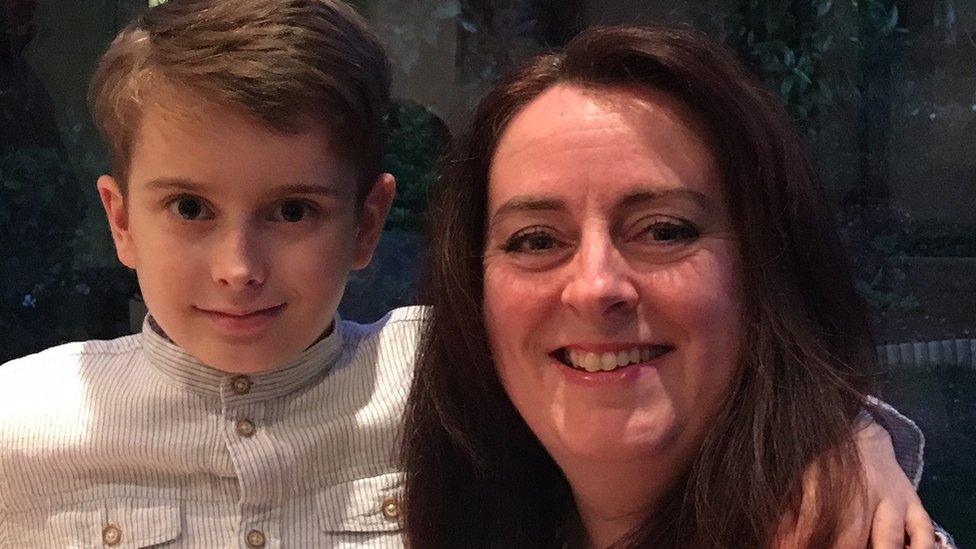
Michelle Henry and her son Darragh, who she said has been described as having a "full Monty" of allergies
The Pharmaceutical Service Negotiation Committee (PSNC), which negotiates with the government and NHS on behalf of pharmacies, has said the supply of other products is likely to be constrained until the EpiPen situation has been resolved.
Ms Henry said her son Darragh has been referred to as "the full Monty" by a consultant because of "the multitude of allergies".
Darragh's allergies are so extreme he once stopped breathing after omelettes were served on a flight.
The vapours from the cooked eggs, released when other passengers around the family opened the meal packaging, were enough to trigger a reaction.
"I had everything out of the medipack and thankfully he was fine," Michelle recalled.
After difficulties getting EpiPens three years ago, Darragh now uses one of the alternatives and the family keeps six of the pens at any one time.
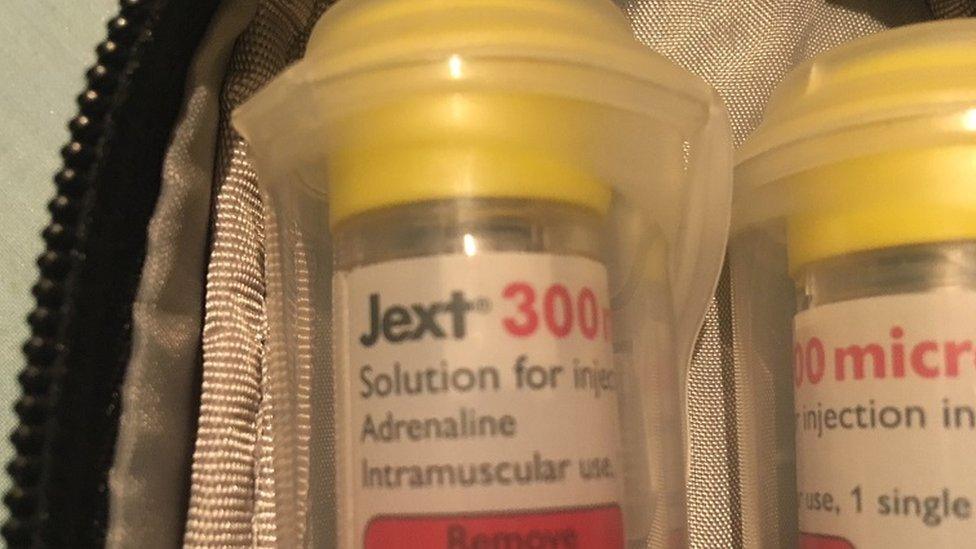
With the EpiPen shortage continuing, the Henry family switched to an alternative - Jext
Darragh carries two, as does his mother, and two are left at his school. Other children may need as many as 10, if they go to childcare facilities or spend time at their grandparents.
"Adrenaline pens are the one most important thing in your medical kit to save your child or an adult in a severe anaphylactic situation," said Michelle.
"Good practice dictates you should have two adrenaline pens, in case a double dose is required and also in case you have a problem with that first pen - a needle breaks, it doesn't inject the adrenaline as it should do."
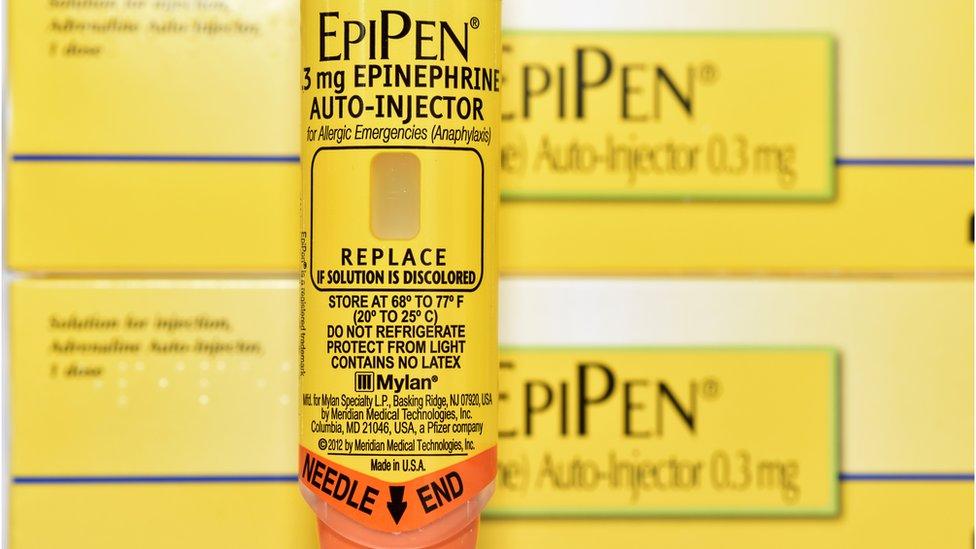
EpiPen is the biggest brand of adrenaline auto-injector on the market
"Two to three years ago I was faced with the exact same problem and I understand there's a current issue, so it's not a one-off.
"If you ask me, it's actually an increasing problem.
'Just as effective'
Mylan , externalsaid pharmaceutical company Pfizer was "working hard" to increase production of EpiPens and supply would stabilise towards the end of the year.
The Health and Social Care Board (HSCB) said it was actively monitoring the availability of all adrenaline auto-injectors in conjunction with wholesalers, and has issued advice to prescribers and community pharmacies in Northern Ireland.
On Friday, Gerard Greene, chief executive of Community Pharmacy NI, said Northern Ireland pharmacies were dealing with supply problems every day.
"The issue with EpiPens is only the tip of the iceberg, because this extends to many, many commonly prescribed drugs and there are real concerns within the pharmacy sector that this is a situation that could develop further and deteriorate," said Mr Greene.
In a statement, the Department of Health said it was aware of the issue.
- Published25 September 2018

- Published30 January 2014
